1. 中英文面试问题
- 格式:doc
- 大小:30.50 KB
- 文档页数:2
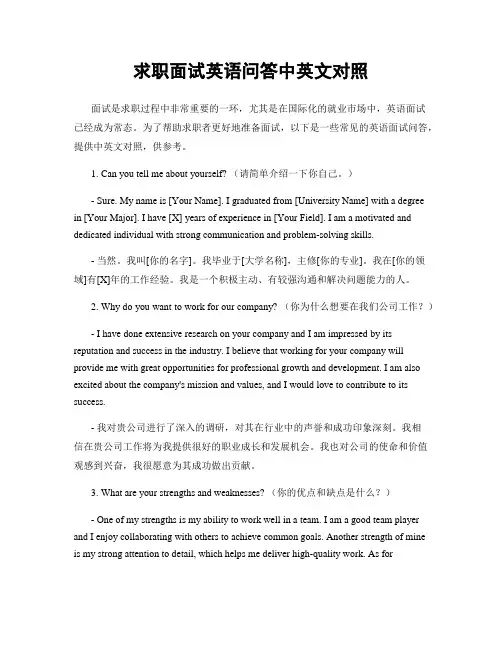
求职面试英语问答中英文对照面试是求职过程中非常重要的一环,尤其是在国际化的就业市场中,英语面试已经成为常态。
为了帮助求职者更好地准备面试,以下是一些常见的英语面试问答,提供中英文对照,供参考。
1. Can you tell me about yourself? (请简单介绍一下你自己。
)- Sure. My name is [Your Name]. I graduated from [University Name] with a degreein [Your Major]. I have [X] years of experience in [Your Field]. I am a motivated and dedicated individual with strong communication and problem-solving skills.- 当然。
我叫[你的名字]。
我毕业于[大学名称],主修[你的专业]。
我在[你的领域]有[X]年的工作经验。
我是一个积极主动、有较强沟通和解决问题能力的人。
2. Why do you want to work for our company? (你为什么想要在我们公司工作?)- I have done extensive research on your company and I am impressed by its reputation and success in the industry. I believe that working for your company will provide me with great opportunities for professional growth and development. I am also excited about the company's mission and values, and I would love to contribute to its success.- 我对贵公司进行了深入的调研,对其在行业中的声誉和成功印象深刻。
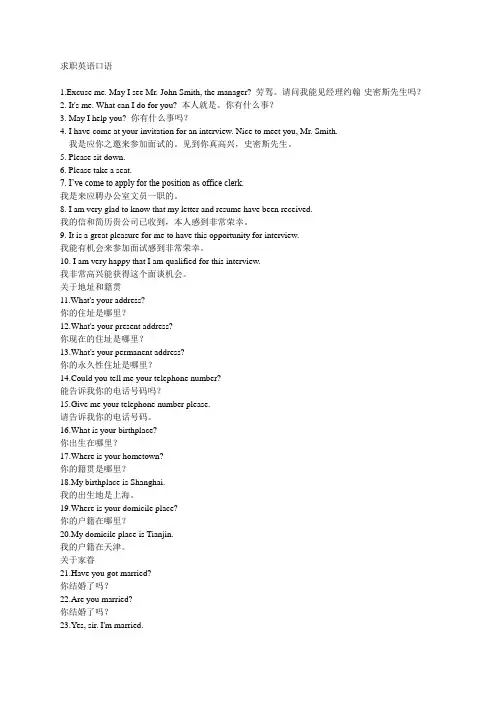
求职英语口语1.Excuse me. May I see Mr. John Smith, the manager? 劳驾。
请问我能见经理约翰·史密斯先生吗?2. It's me. What can I do for you? 本人就是。
你有什么事?3. May I help you? 你有什么事吗?4. I have come at your invitation for an interview. Nice to meet you, Mr. Smith.我是应你之邀来参加面试的。
见到你真高兴,史密斯先生。
5. Please sit down.6. Please take a seat.7. I’ve come to apply for the position as office clerk.我是来应聘办公室文员一职的。
8. I am very glad to know that my letter and resume have been received.我的信和简历贵公司已收到,本人感到非常荣幸。
9. It is a great pleasure for me to have this opportunity for interview.我能有机会来参加面试感到非常荣幸。
10. I am very happy that I am qualified for this interview.我非常高兴能获得这个面谈机会。
关于地址和籍贯11.What's your address?你的住址是哪里?12.What's your present address?你现在的住址是哪里?13.What's your permanent address?你的永久性住址是哪里?14.Could you tell me your telephone number?能告诉我你的电话号码吗?15.Give me your telephone number please.请告诉我你的电话号码。
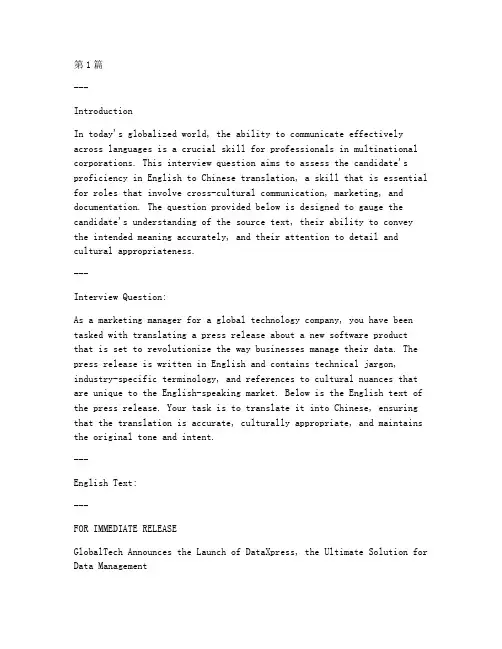
第1篇---IntroductionIn today's globalized world, the ability to communicate effectively across languages is a crucial skill for professionals in multinational corporations. This interview question aims to assess the candidate's proficiency in English to Chinese translation, a skill that is essential for roles that involve cross-cultural communication, marketing, and documentation. The question provided below is designed to gauge the candidate's understanding of the source text, their ability to convey the intended meaning accurately, and their attention to detail and cultural appropriateness.---Interview Question:As a marketing manager for a global technology company, you have been tasked with translating a press release about a new software productthat is set to revolutionize the way businesses manage their data. The press release is written in English and contains technical jargon, industry-specific terminology, and references to cultural nuances that are unique to the English-speaking market. Below is the English text of the press release. Your task is to translate it into Chinese, ensuring that the translation is accurate, culturally appropriate, and maintains the original tone and intent.---English Text:---FOR IMMEDIATE RELEASEGlobalTech Announces the Launch of DataXpress, the Ultimate Solution for Data Management[City, Country] – GlobalTech, a leading provider of innovative data management solutions, is proud to announce the launch of DataXpress, the latest addition to its suite of cutting-edge products. DataXpress is designed to transform the way businesses store, analyze, and securetheir data, offering a comprehensive solution that addresses the evolving challenges of the digital age.A Game-Changer for Data ManagementDataXpress is a revolutionary software platform that leverages advanced machine learning algorithms to optimize data storage and retrieval processes. With its intuitive user interface and robust security features, DataXpress empowers businesses to manage their data more efficiently and securely than ever before.“DataXpress is a game-changer for data management,” says John Smith, Chief Technology Officer at GlobalTech. “Our team has poured years of research and development into creating a product that not only meets the demands of today’s data-intensive businesses but also prepares them for the challenges of tomorrow.”Key Features of DataXpress:- Intelligent Data Storage: Utilizes machine learning to analyze and categorize data, ensuring optimal storage solutions.- Advanced Analytics: Offers powerful tools for data analysis, allowing businesses to gain actionable insights from their data.- Enhanced Security: Implements cutting-edge encryption techniques to protect sensitive data from unauthorized access.- Scalable Architecture: Designed to handle large volumes of data and scale with the growth of the business.- Comprehensive Support: Provides 24/7 customer support to ensure smooth implementation and ongoing assistance.GlobalTech’s Commitment to InnovationGlobalTech has a long-standing reputation for innovation and excellence in data management. With DataXpress, the company continues its commitment to providing cutting-edge solutions that empower businesses to thrive in the digital era.“DataXpress is the result of our dedica tion to driving technological advancements in data management,” says Sarah Johnson, President of GlobalTech. “We are confident that this product will become anessential tool for businesses worldwide.”Availability and PricingDataXpress is now available f or purchase through GlobalTech’s official website. Pricing starts at $99 per month for a basic subscription, with discounts available for annual commitments.About GlobalTechGlobalTech is a global leader in data management solutions, offering a wide range of products and services designed to help businesses manage their data effectively. With a focus on innovation and customer satisfaction, GlobalTech has become a trusted partner for businesses around the world.---Instructions for the Candidate:1. Read the entire press release carefully to ensure you understand the context and the intended message.2. Pay close attention to technical jargon, industry-specific terminology, and cultural nuances.3. Translate the press release into Chinese, ensuring that the translation is accurate and maintains the original tone and intent.4. Your translation should be clear, concise, and culturally appropriate.5. Pay attention to grammar, punctuation, and formatting.6. Submit your translation in a separate document.---Evaluation Criteria:- Accuracy: The translation should accurately reflect the original text, including technical terms and industry-specific jargon.- Cultural Appropriateness: The translation should be culturally appropriate, taking into account the target audience and cultural nuances.- Tone and Intent: The translation should maintain the original tone and intent of the press release.- Clarity and Conciseness: The translation should be clear and concise, avoiding unnecessary wordiness or ambiguity.- Grammar and Punctuation: The translation should be grammatically correct and punctuated accurately.---This interview question is designed to test the candidate's proficiency in English to Chinese translation, their attention to detail, and their ability to adapt to the specific requirements of the target language and culture.第2篇IntroductionThe role of a translator is pivotal in the globalized world, where communication across languages is essential for business, culture, and education. This document outlines a comprehensive set of interview questions designed to assess the skills, knowledge, and personality of candidates applying for a translator position. The questions are categorized into different sections to provide a structured approach to evaluating the candidate's suitability for the role.Section 1: Language Proficiency and Translation Skills1. Tell us about your language background. What languages do youfluently speak and write?2. Can you describe a challenging translation project you have worked on and how you overcame the difficulties?3. How do you ensure the accuracy and consistency of your translations?4. What tools and software do you use for translation work? Explain how you utilize them effectively.5. Discuss the importance of context in translation. Give an example of how you handled a contextually challenging translation.6. How do you maintain the tone and style of the original text in your translations?7. Describe a time when you had to translate a technical term or concept. How did you approach it?8. What is your approach to translating idiomatic expressions?9. How do you handle cultural differences in your translations?10. Can you explain the difference between literal translation and free translation? Give an example of each.Section 2: Specialization and Industry Knowledge11. What is your area of specialization in translation (e.g., legal, medical, technical, literary)?12. Can you provide examples of specialized terminology in your fieldand how you handle them?13. How do you stay updated with the latest developments in your specialized field?14. What experience do you have in translating documents related to [specific industry or field]?15. How do you ensure the cultural relevance of your translations withina specific industry?16. Can you describe a situation where you had to adapt your translation style to suit a specific audience within an industry?17. What are the key challenges you face when translating documents from [specific source language] to [specific target language]?18. How do you ensure the confidentiality of sensitive information in your translations?19. What are the legal and ethical considerations you take into account when translating documents?Section 3: Project Management and Work Style20. How do you prioritize and manage multiple translation projects simultaneously?21. Can you describe your workflow for a typical translation project?22. What is your approach to meeting tight deadlines?23. How do you ensure quality control in your translations?24. What feedback mechanisms do you use to improve your translation work?25. How do you handle client queries and revisions?26. What experience do you have with project management tools and software?27. How do you ensure effective communication with clients and colleagues?28. What is your approach to working in a team on translation projects?29. How do you handle pressure and stress in your work environment?30. What are your long-term career goals in the field of translation?Section 4: Professional Development and Learning31. How do you stay motivated in your translation work?32. What professional development opportunities have you pursued in the past year?33. How do you stay current with industry trends and advancements in translation technology?34. What are your preferred methods for learning new languages and terminology?35. How do you keep your language skills sharp and up-to-date?36. What certifications or qualifications do you hold in translation or related fields?37. What professional organizations or networks are you a part of in the translation industry?38. How do you approach continuous learning and improvement in your work?39. What advice would you give to someone starting their career in translation?40. How do you envision your professional growth over the next five years?ConclusionThese interview questions are designed to provide a comprehensive evaluation of a candidate's suitability for a translator position. By asking a wide range of questions, employers can gain insights into the candidate's language proficiency, translation skills, specialization knowledge, project management abilities, work style, and professional development aspirations. It is important to tailor these questions to the specific requirements of the role and the company to ensure the best fit for the position.第3篇Introduction:As a professional Chinese-English interpreter, you are expected to possess not only linguistic proficiency but also cultural understanding, quick thinking, and the ability to adapt to various communication scenarios. This comprehensive set of interview questions is designed to assess your skills, experience, and suitability for a Chinese-English interpreter position.1. Personal Background and Language SkillsQuestion 1: Can you please introduce yourself and tell us about your background in language learning and interpretation?Answer:[Your name] is a dedicated and highly motivated individual with a strong passion for language and cross-cultural communication. I hold a Bachelor’s degree in Translation and Interpretation from [University Name], where I majored in Chinese-English translation and interpretation. Throughout my academic journey, I have consistently achieved top gradesin both language courses and practical interpretation exercises.My interest in languages began at a young age, and I have sincededicated myself to mastering both Chinese and English. I have completed numerous translation and interpretation projects, including conferences, business meetings, and cultural events. My proficiency in both languages is not only linguistic but also cultural, as I have lived and worked in both China and English-speaking countries, providing me with a deep understanding of the nuances of both languages and cultures.Question 2: What are the main differences between Chinese and English in terms of grammar, vocabulary, and usage? How do you handle these differences when interpreting?Answer:The main differences between Chinese and English lie in their grammatical structures, vocabulary, and usage. For example, Chinese has no articles, while English requires articles in certain contexts.Additionally, Chinese tends to use more idiomatic expressions and proverbs, which can be challenging to translate directly into English.To handle these differences, I approach each interpretation task with a keen awareness of the cultural and linguistic nuances involved. I focus on understanding the context of the conversation, identifying the intended meaning behind the words, and then conveying that meaning in a way that is natural and appropriate for the target language. This often involves using synonyms, paraphrasing, or even creating new expressions to ensure the message is accurately and effectively communicated.2. Professional Experience and SkillsQuestion 3: Can you describe your experience in interpreting at conferences and business meetings? What were some of the challenges you faced, and how did you overcome them?Answer:Throughout my career, I have had the opportunity to interpret at numerous conferences and business meetings, including international trade fairs, seminars, and corporate events. One of the challenges I often face is the need to quickly adapt to the specific terminology and industry jargon used by the participants.To overcome this challenge, I spend time researching the relevant subject matter before the event and familiarize myself with the key terms and concepts. I also actively seek feedback from the participants to ensure that my interpretations are accurate and clear. Additionally, I maintain a calm and professional demeanor to manage the pressure and ensure a smooth flow of communication.Question 4: What is your approach to consecutive interpretation? Can you give an example of a situation where you used consecutive interpretation effectively?Answer:Consecutive interpretation requires a high level of concentration, memory, and language skills. My approach to consecutive interpretationinvolves listening carefully to the speaker, mentally processing the information, and then conveying the message in the target language in a coherent and concise manner.One example of a situation where I used consecutive interpretation effectively was during a business negotiation between a Chinese company and an international client. The negotiation involved complex technical terms and required a deep understanding of both the business context and the cultural nuances of the conversation. By maintaining a calm demeanor and focusing on the key points, I was able to convey the message accurately and facilitate a successful negotiation.Question 5: How do you prepare for a major interpreting assignment? What are some of the resources you use?Answer:Preparing for a major interpreting assignment involves several steps. First, I research the topic and the participants to understand the context and the key issues at stake. I then familiarize myself with the relevant terminology and industry jargon, using dictionaries, glossaries, and online resources.I also prepare by practicing the interpretation of sample text and role-playing scenarios to improve my timing and delivery. Additionally, I ensure that I am well-rested and hydrated on the day of the event to maintain peak performance.3. Adaptability and Problem-SolvingQuestion 6: Describe a time when you had to interpret in a challengingor unfamiliar environment. How did you handle the situation?Answer:During a recent conference, I was asked to interpret in a venue that was extremely noisy due to construction work. This made it difficult to hear the speakers clearly and to convey the message accurately to the participants.To handle the situation, I asked the organizers to move the interpreter booth closer to the speakers and to provide noise-cancelling headphones.I also increased my focus and concentration, and made a conscious effort to repeat key points and ask for clarifications when necessary. Despite the challenging environment, I was able to maintain the quality of my interpretation and ensure that the event ran smoothly.Question 7: How do you handle situations where there is a cultural misunderstanding or miscommunication during an interpretation?Answer:Cultural misunderstandings can occur at any time during an interpretation, and it is important to address them promptly and effectively. When I encounter a cultural misunderstanding, I take a few moments to pause and reflect on the context and the likely source of the misunderstanding.I then clarify the point with the speaker, ensuring that I have a clear understanding of their intentions. If necessary, I seek additional information from the participants to facilitate a more accurate interpretation. By maintaining open communication and showing empathy, I can often resolve cultural misunderstandings and ensure a successful interpretation.4. Ethics and ProfessionalismQuestion 8: What are your ethical considerations when working as an interpreter? Can you give an example of a situation where you had to adhere to an ethical guideline?Answer:As an interpreter, I am bound by a set of ethical guidelines that emphasize confidentiality, neutrality, and professionalism. These guidelines ensure that I maintain the integrity of the communication process and protect the interests of all parties involved.One example of a situation where I had to adhere to an ethical guideline was during a legal deposition. I was required to remain neutral andimpartial, ensuring that the interpretation accurately reflected the statements of both the plaintiff and the defendant. By adhering to these ethical principles, I was able to maintain the integrity of the legal process and provide a fair and accurate account of the proceedings.Question 9: How do you ensure the confidentiality of sensitive information during an interpretation?Answer:Confidentiality is a crucial aspect of interpretation, and I take it very seriously. To ensure the confidentiality of sensitive information, I follow these steps:1. Understand the context: Before beginning the interpretation, Iclarify the nature of the information being shared and anyconfidentiality requirements.2. Establish trust: I build a strong rapport with the participants, ensuring that they trust me to handle sensitive information with care.3. Maintain confidentiality: I do not discuss the interpretation with anyone outside of the assignment and take steps to secure any physical or digital materials related to the interpretation.4. Legal compliance: I am aware of the legal requirements for confidentiality in my jurisdiction and ensure that I comply with all relevant laws and regulations.5. ConclusionAs a professional Chinese-English interpreter, I am committed to providing high-quality, accurate, and culturally sensitiveinterpretation services. I am confident that my language skills, professional experience, and ethical standards make me a suitable candidate for this position. I am eager to contribute to your team and help facilitate effective communication between Chinese and English-speaking parties. Thank you for considering my application.。
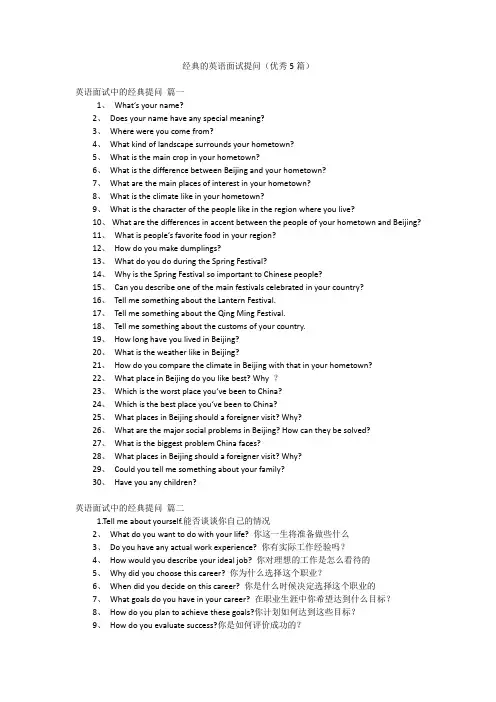
经典的英语面试提问(优秀5篇)英语面试中的经典提问篇一1、What‘s your name?2、Does your name have any special meaning?3、Where were you come from?4、What kind of landscape surrounds your hometown?5、What is the main crop in your hometown?6、What is the difference between Beijing and your hometown?7、What are the main places of interest in your hometown?8、What is the climate like in your hometown?9、What is the character of the people like in the region where you live?10、What are the differences in accent between the people of your hometown and Beijing?11、What is people‘s favorite food in your region?12、How do you make dumplings?13、What do you do during the Spring Festival?14、Why is the Spring Festival so important to Chinese people?15、Can you describe one of the main festivals celebrated in your country?16、Tell me something about the Lantern Festival.17、Tell me something about the Qing Ming Festival.18、Tell me something about the customs of your country.19、How long have you lived in Beijing?20、What is the weather like in Beijing?21、How do you compare the climate in Beijing with that in your hometown?22、What place in Beijing do you like best? Why ?23、Which is the worst place you‘ve been to China?24、Which is the best place you‘ve been to China?25、What places in Beijing should a foreigner visit? Why?26、What are the major social problems in Beijing? How can they be solved?27、What is the biggest problem China faces?28、What places in Beijing should a foreigner visit? Why?29、Could you tell me something about your family?30、Have you any children?英语面试中的经典提问篇二1.Tell me about yourself.能否谈谈你自己的情况2、What do you want to do with your life? 你这一生将准备做些什么3、Do you have any actual work experience? 你有实际工作经验吗?4、How would you describe your ideal job? 你对理想的工作是怎么看待的5、Why did you choose this career? 你为什么选择这个职业?6、When did you decide on this career? 你是什么时候决定选择这个职业的7、What goals do you have in your career? 在职业生涯中你希望达到什么目标?8、How do you plan to achieve these goals?你计划如何达到这些目标?9、How do you evaluate success?你是如何评价成功的?10、Describe a situation in which you were successful. 请简单谈谈令你感觉成功的具体情形?11、What do you think it takes to be successful in this career? 你认为在这个领域要成功需要做些什么准备?12、What accomplishments have given you the most satisfaction in your life? 在你的职业生涯中那些成就使你最为满意?13、If you had to live your life over again, what would you change? 假如人生可以重新开始,你会有些什么样的改变?14、Would your rather work with information or with people? 你喜欢与人打交道还是喜欢同信息打交道?15、Are you a team player? 你是一位团队成员吗?16、What motivates you? 你的动机是什么?17、Why should I hire you? 为什么我们应聘用你?18、Are you a goal-oriented person? 你是目标导向型的人吗?19、Tell me about some of your recent goals and what you did to achieve them. 能否谈谈你的近期目标以及你准备怎样实现?20、What are your short-term goals? 你的短期目标是什么?21、What is your long-range objective? 你的长期目标是什么?22、What do you see yourself doing five years from now? 从现在起5年内你希望做些什么?23、Where do you want to be ten years from now? 从现在起10年内你想做些什么?24、Do you handle conflict well? 你能妥善解决冲突吗?25、Have you ever had a conflict with a boss or professor? How did you resolve it? 你以前是否与老板或者导师发生冲突?你是如何处理的呢?26、What major problem have you had to deal with recently? 近来你处理的主要问题是什么?27、Do you handle pressure well? 你能应对压力型的工作环境吗?28、What is your greatest strength? 你的突出优势是什么?29、What is your greatest weakness? 你最大的不足是什么?30、If I were to ask one of your professors to describe you, what would he or she say? 如果我向你的导师了解你的情况,你认为他或者她会怎么评价你?31、Why did you choose to attend your college? 你为什么去上大学?32、What changes would you make at your college? 在大学里你将会有什么变化33、How has your education prepared you for your career? 你认为自己的学业对你的职业生涯做了哪些准备34、What were your favorite classes? Why? 你喜欢那些课程?为什么?35、Do you enjoy doing independent research? 你喜欢独立搞研究吗?36、Who were your favorite professors? Why? 你喜欢那些教授?为什么?37、Why is your GPA not higher?你的学业成绩为什么不高?38、Do you have any plans for further education? 你对自己的深造有什么安排吗?39、How much training do you think you#39;ll need to become a productive employee? 在成为一名优秀的员工之前,你认为需要多长时间的?40、What qualities do you feel a successful manager should have? 你认为一个成功的经理应具备什么样的品质?41、Why do you want to work in the _____ industry? 你为什么会对本行业有兴趣?42、What do you know about our company? 你对我们公司了解些什么?43、Why are you interested in our company? 你为什么会对我们公司感兴趣?44、Do you have any location preferences? 你对工作地点有什么特殊要求吗?45、How familiar are you with the community that we#39;re located in? 你对我们所在的社区了解程度有多少?46、Will you relocate? In the future? 将来你会迁往别处吗?47、Are you willing to travel? How much? 你愿意去旅行吗?去多远48、Is money important to you? 金钱对于你来说很重要吗?49、How much money do you need to make to be happy? 多少薪金你会感觉满意50、What kind of salary are you looking for? 您的期望薪金是多少?英语面试常见问题篇三以下为往年来我校招聘单位面试时常问到的问题,还包含部分网载的常见面试问题,所提答题思路希望会给同学一点启发,面试时大家能做到举一反三。
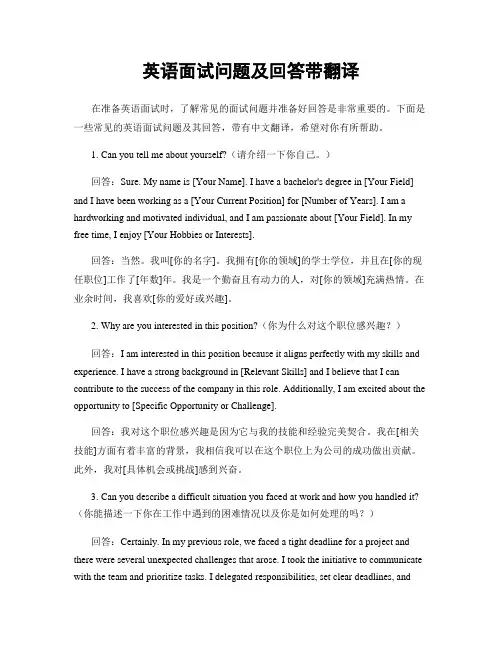
英语面试问题及回答带翻译在准备英语面试时,了解常见的面试问题并准备好回答是非常重要的。
下面是一些常见的英语面试问题及其回答,带有中文翻译,希望对你有所帮助。
1. Can you tell me about yourself?(请介绍一下你自己。
)回答:Sure. My name is [Your Name]. I have a bachelor's degree in [Your Field] and I have been working as a [Your Current Position] for [Number of Years]. I am a hardworking and motivated individual, and I am passionate about [Your Field]. In my free time, I enjoy [Your Hobbies or Interests].回答:当然。
我叫[你的名字]。
我拥有[你的领域]的学士学位,并且在[你的现任职位]工作了[年数]年。
我是一个勤奋且有动力的人,对[你的领域]充满热情。
在业余时间,我喜欢[你的爱好或兴趣]。
2. Why are you interested in this position?(你为什么对这个职位感兴趣?)回答:I am interested in this position because it aligns perfectly with my skills and experience. I have a strong background in [Relevant Skills] and I believe that I can contribute to the success of the company in this role. Additionally, I am excited about the opportunity to [Specific Opportunity or Challenge].回答:我对这个职位感兴趣是因为它与我的技能和经验完美契合。
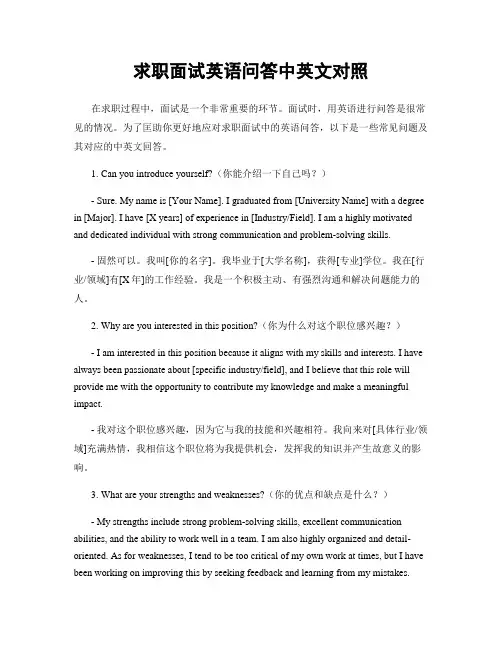
求职面试英语问答中英文对照在求职过程中,面试是一个非常重要的环节。
面试时,用英语进行问答是很常见的情况。
为了匡助你更好地应对求职面试中的英语问答,以下是一些常见问题及其对应的中英文回答。
1. Can you introduce yourself?(你能介绍一下自己吗?)- Sure. My name is [Your Name]. I graduated from [University Name] with a degree in [Major]. I have [X years] of experience in [Industry/Field]. I am a highly motivated and dedicated individual with strong communication and problem-solving skills.- 固然可以。
我叫[你的名字]。
我毕业于[大学名称],获得[专业]学位。
我在[行业/领域]有[X年]的工作经验。
我是一个积极主动、有强烈沟通和解决问题能力的人。
2. Why are you interested in this position?(你为什么对这个职位感兴趣?)- I am interested in this position because it aligns with my skills and interests. I have always been passionate about [specific industry/field], and I believe that this role will provide me with the opportunity to contribute my knowledge and make a meaningful impact.- 我对这个职位感兴趣,因为它与我的技能和兴趣相符。
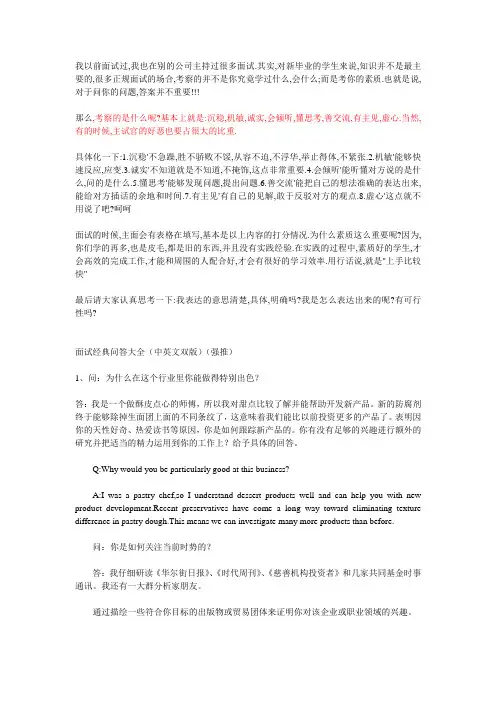
我以前面试过,我也在别的公司主持过很多面试.其实,对新毕业的学生来说,知识并不是最主要的,很多正规面试的场合,考察的并不是你究竟学过什么,会什么;而是考你的素质.也就是说,对于问你的问题,答案并不重要!!!那么,考察的是什么呢?基本上就是:沉稳,机敏,诚实,会倾听,懂思考,善交流,有主见,虚心.当然,有的时候,主试官的好恶也要占很大的比重.具体化一下:1.沉稳'不急躁,胜不骄败不馁,从容不迫,不浮华,举止得体,不紧张.2.机敏'能够快速反应,应变.3.诚实'不知道就是不知道,不掩饰,这点非常重要.4.会倾听'能听懂对方说的是什么,问的是什么.5.懂思考'能够发现问题,提出问题.6.善交流'能把自己的想法准确的表达出来,能给对方插话的余地和时间.7.有主见'有自己的见解,敢于反驳对方的观点.8.虚心'这点就不用说了吧?呵呵面试的时候,主面会有表格在填写,基本是以上内容的打分情况.为什么素质这么重要呢?因为,你们学的再多,也是皮毛,都是旧的东西,并且没有实践经验.在实践的过程中,素质好的学生,才会高效的完成工作,才能和周围的人配合好,才会有很好的学习效率.用行话说,就是"上手比较快"最后请大家认真思考一下:我表达的意思清楚,具体,明确吗?我是怎么表达出来的呢?有可行性吗?面试经典问答大全(中英文双版)(强推)1、问:为什么在这个行业里你能做得特别出色?答:我是一个做酥皮点心的师傅,所以我对甜点比较了解并能帮助开发新产品。
新的防腐剂终于能够除掉生面团上面的不同条纹了,这意味着我们能比以前投资更多的产品了。
表明因你的天性好奇、热爱读书等原因,你是如何跟踪新产品的。
你有没有足够的兴趣进行额外的研究并把适当的精力运用到你的工作上?给予具体的回答。
Q:Why would you be particularly good at this business?A:I was a pastry chef,so I understand dessert products well and can help you with new product development.Recent preservatives have come a long way toward eliminating texture difference in pastry dough.This means we can investigate many more products than before.问:你是如何关注当前时势的?答:我仔细研读《华尔街日报》、《时代周刊》、《慈善机构投资者》和几家共同基金时事通讯。
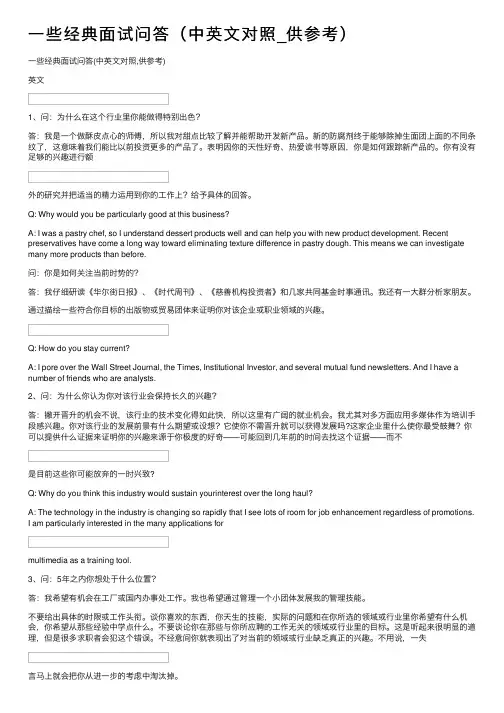
⼀些经典⾯试问答(中英⽂对照_供参考)⼀些经典⾯试问答(中英⽂对照,供参考)英⽂1、问:为什么在这个⾏业⾥你能做得特别出⾊?答:我是⼀个做酥⽪点⼼的师傅,所以我对甜点⽐较了解并能帮助开发新产品。
新的防腐剂终于能够除掉⽣⾯团上⾯的不同条纹了,这意味着我们能⽐以前投资更多的产品了。
表明因你的天性好奇、热爱读书等原因,你是如何跟踪新产品的。
你有没有⾜够的兴趣进⾏额外的研究并把适当的精⼒运⽤到你的⼯作上?给予具体的回答。
Q: Why would you be particularly good at this business?A: I was a pastry chef, so I understand dessert products well and can help you with new product development. Recent preservatives have come a long way toward eliminating texture difference in pastry dough. This means we can investigate many more products than before.问:你是如何关注当前时势的?答:我仔细研读《华尔街⽇报》、《时代周刊》、《慈善机构投资者》和⼏家共同基⾦时事通讯。
我还有⼀⼤群分析家朋友。
通过描绘⼀些符合你⽬标的出版物或贸易团体来证明你对该企业或职业领域的兴趣。
Q: How do you stay current?A: I pore over the Wall Street Journal, the Times, Institutional Investor, and several mutual fund newsletters. And I have a number of friends who are analysts.2、问:为什么你认为你对该⾏业会保持长久的兴趣?答:撇开晋升的机会不说,该⾏业的技术变化得如此快,所以这⾥有⼴阔的就业机会。
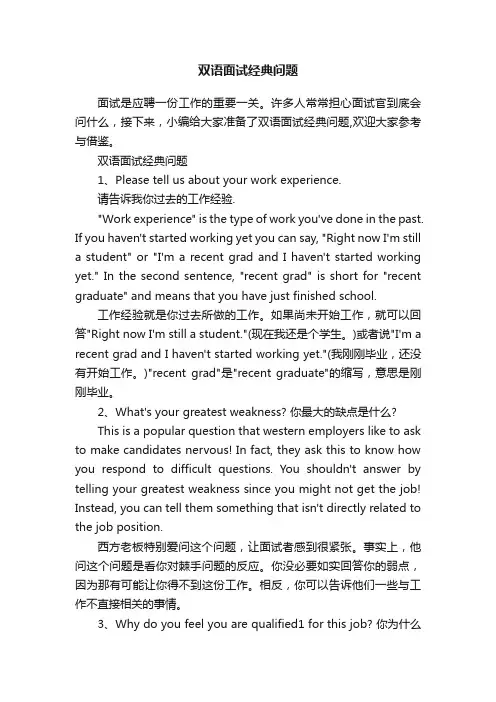
双语面试经典问题面试是应聘一份工作的重要一关。
许多人常常担心面试官到底会问什么,接下来,小编给大家准备了双语面试经典问题,欢迎大家参考与借鉴。
双语面试经典问题1、Please tell us about your work experience.请告诉我你过去的工作经验."Work experience" is the type of work you've done in the past. If you haven't started working yet you can say, "Right now I'm still a student" or "I'm a recent grad and I haven't started working yet." In the second sentence, "recent grad" is short for "recent graduate" and means that you have just finished school.工作经验就是你过去所做的工作。
如果尚未开始工作,就可以回答"Right now I'm still a student."(现在我还是个学生。
)或者说"I'm a recent grad and I haven't started working yet."(我刚刚毕业,还没有开始工作。
)"recent grad"是"recent graduate"的缩写,意思是刚刚毕业。
2、What's your greatest weakness? 你最大的缺点是什么?This is a popular question that western employers like to ask to make candidates nervous! In fact, they ask this to know how you respond to difficult questions. You shouldn't answer by telling your greatest weakness since you might not get the job! Instead, you can tell them something that isn't directly related to the job position.西方老板特别爱问这个问题,让面试者感到很紧张。
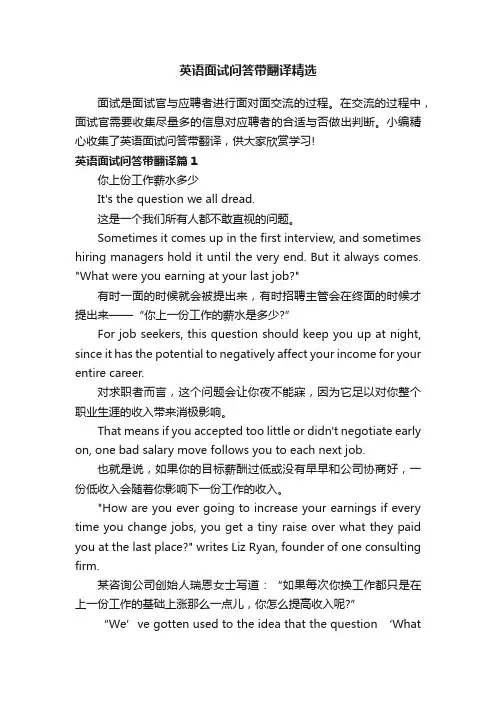
英语面试问答带翻译精选面试是面试官与应聘者进行面对面交流的过程。
在交流的过程中,面试官需要收集尽量多的信息对应聘者的合适与否做出判断。
小编精心收集了英语面试问答带翻译,供大家欣赏学习!英语面试问答带翻译篇1你上份工作薪水多少It's the question we all dread.这是一个我们所有人都不敢直视的问题。
Sometimes it comes up in the first interview, and sometimes hiring managers hold it until the very end. But it always comes. "What were you earning at your last job?"有时一面的时候就会被提出来,有时招聘主管会在终面的时候才提出来——“你上一份工作的薪水是多少?”For job seekers, this question should keep you up at night, since it has the potential to negatively affect your income for your entire career.对求职者而言,这个问题会让你夜不能寐,因为它足以对你整个职业生涯的收入带来消极影响。
That means if you accepted too little or didn't negotiate early on, one bad salary move follows you to each next job.也就是说,如果你的目标薪酬过低或没有早早和公司协商好,一份低收入会随着你影响下一份工作的收入。
"How are you ever going to increase your earnings if every time you change jobs, you get a tiny raise over what they paid you at the last place?" writes Liz Ryan, founder of one consulting firm.某咨询公司创始人瑞恩女士写道:“如果每次你换工作都只是在上一份工作的基础上涨那么一点儿,你怎么提高收入呢?”“We’ve gotten used to the idea that the question ‘Whatwere you earning before?’ from a prospective employer is perfectly reasonable. It's not, of course. Your personal finances are your business.”“我们都觉得面试官问‘你以前挣多少?’太正常了,也习惯于去回答这个问题。
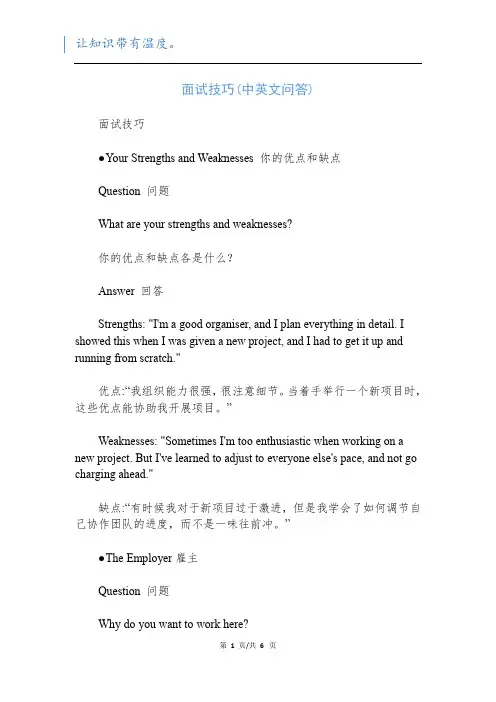
面试技巧(中英文问答)面试技巧●Your Strengths and Weaknesses 你的优点和缺点Question 问题What are your strengths and weaknesses?你的优点和缺点各是什么?Answer 回答Strengths: "I'm a good organiser, and I plan everything in detail. I showed this when I was given a new project, and I had to get it up and running from scratch."优点:“我组织能力很强,很注意细节。
当着手举行一个新项目时,这些优点能协助我开展项目。
”Weaknesses: "Sometimes I'm too enthusiastic when working on a new project. But I've learned to adjust to everyone else's pace, and not go charging ahead."缺点:“有时候我对于新项目过于激进,但是我学会了如何调节自己协作团队的进度,而不是一味往前冲。
”●The Employer雇主Question 问题Why do you want to work here?你为什么应聘我们公司?Answer 回答"Smith's is a respected firm with a reputation for high quality work, and I'd like to be part of that success. The quality of my work is important to me, so I feel I'd be at the right place. I've also heard you invest in your sta- by training and developing them."“史密斯是业界一家很有声望的公司,以高质量的工作取胜。
英语面试问题(中英文对照)面试英语-应聘理由篇1、Why are you interested in working for our company?为什么有兴趣在我们公司工作?2、Because your company has a good sales record.因为你们公司有良好的销售记录。
3、Because your operations are global, so I feel I can gain the most from workingin this kind of environment.因为你们公司的运作是全球化的,我觉得可以在这样一个环境中工作会有最大的收获。
4、Because I think my major is suitable for this position.因为我认为我的专业适合这个职位。
5、Because I can learn new things in your company, at the same timeI can offer my services to you.因为我可以在贵公司学到新的东西, 同时能为你们提供服务。
6、Because I’m very interested in your company’s training program.因为我对你们公司的培训计划很感兴趣。
面试英语-个人品质篇1、What are your great strengths?你有什么优点?2、I’m a good team player.我是一个富有团队精神的人。
3、I’m a hard-working, persistent person.我工作刻苦,性情执着。
4、I’m a fast-learner.我学东西很快。
5、I can work under pressure and get along with my colleagues.我能在压力下工作,并能与同事和谐相处。
英语面试常见问题中英互译英语面试常见问题(中英互译)面试时,我们会面对形形色色的问题,而最令人哑口无言的,往往是一些最简单和最常见的题目,比如"请你自我介绍一下"。
大多数应征者的反应是--我应该如何作答呢?其实要懂得应对此问题,就要先做好准备You'll have a better chance of impressing the interviewer if you think about this question before the interview.The first thing to realize is that the question, "Tell me about yourself," provides you with a great chance to promote your strong points. This is particularly important when applying for a job that is different from what you have done in the past. You need to show the interviewer that your previous jobs provide you with skills that can be used in the new job.WHAT TO TALK ABOUT 如何介绍?你可以选择三个重点来介绍自己,但避免重复履历中曾提及的资料。
Around this skeleton should be the meat of your answer; your less obvious, but important skills. Here are some of the skills that you might want to mention. 你可以介绍自己是:Problem solver 解决问题能手Creative thinker 充满创意Accurate 小心谨慎People person 与人相处融洽Team player 合群Organized 组织力高This doesn't mean that you just say, "I'm a great problem solver." Instead, explain how you used your problem-solving skills at your previous job. 事例比自我夸耀更能说明问题。
中英文对照的面试题下面跟大家提供30道中英文对照的题,大家敬请关注:Q: Can you sell yourself in two mi**es? Go for it. (你能在两分钟內自我推荐吗?大胆试试吧!)A: With my qualifications and experience, I feel I am hardworking,responsible and diligent in any project I undertake. Your organization couldbenefit from my analytical and interpersonal skills.(依我的资格和,我觉得我对所从事的每一个工程都很努力、负责、勤勉。
我的分析能力和与人相处的技巧,对贵单位必有价值。
)Q:Give me a summary of your current job description. (对你目前的工作,能否做个概括的说明。
)A:I have been working as a puter programmer for five years. To bespecific, I do system analysis, trouble shooting and provide software support.(我干了五年的电脑程序员。
具体地说,我做系统分析,解决问题以及软件供给方面的支持。
)Q:Why did you leave your last job?(你为什么离职呢?)A: Well, I am hoping to get an offer of a better position. Ifopportunity knocks, I will take it.(我希望能获得一份更好的工作,如果时机来临,我会抓住。
)A:I feel I have reached the "glass ceiling" in my currentjob. / I feel there is no opportunity for advancement. (我觉得目前的工作,已经到达顶峰,即沒有升迁时机。
求职面试英语问答中英文对照范文面试英语问答中英文对照范文Introduction:As a job seeker, it is crucial to be well-prepared for an interview, especially in termsof English language skills. In this document, we provide a range of commonly asked interview questions along with their corresponding answers in both English and Chinese. These sample answers can serve as a reference to help you effectively communicate your qualifications and experiences during a job interview.1. Can you tell me about yourself?English:I am a highly motivated and experienced professional with a strong background in marketing. I have worked for several multinational companies, where I successfully managed various marketing campaigns and projects. I am skilled in market research, strategic planning, and digital marketing.Chinese:我是一名积极主动、经验丰富的市场营销专业人员。
我曾在多家跨国公司工作,成功管理了多个市场营销活动和项目。
复试提问自我介绍常见问句(中英文版)英文文档:During the second round of interviews, it is common for interviewers to ask specific questions to gain a deeper understanding of the candidate"s background, skills, and motivations.Some common questions include:1.Can you tell me more about your previous work experience?2.How do you handle stress and pressure in a work environment?3.What are your strengths and weaknesses?4.How do you prioritize tasks and manage your time?5.Can you give an example of a difficult situation you have faced and how you resolved it?6.What are your career goals and how does this position fit into your plans?7.How do you work in a team and what is your approach to collaboration?8.What motivates you and keeps you engaged in your work?9.Can you tell us about a project you have worked on that you are proud of?10.How do you deal with feedback and criticism?中文文档:在复试环节,面试官通常会问一些具体问题,以深入了解候选人的背景、技能和动机。
1.谈谈你自己。
考察基本表达能力
2.谈谈你的优缺点。
考察基本表达能力
3.你的兴趣爱好。
考察基本表达能力
4.请介绍一下你的家庭。
考察处理社会关系及社交能力
5.你的朋友怎么看待你?考察处理社会关系及社交能力
6.你交朋友最注重什么? 考察处理社会关系及社交能力
7.你为什么选择你的专业?考察你在学校学习的专业技能知识
8.请谈谈你从事这份工作的优势。
考察你在学校学习的专业技能知识
1.你选择本公司的原因? 考察你的求职动机
2.你看中本公司的最重要的是什么? 考察你的求职动机
3.你对我们了解多少? 考察你的求职动机
4.你希望你工资一个月多少钱? 考察你的求职动机
5.你觉得你适合本工作么? 考察你的判断力和情绪稳定性
6.我觉得你不适合我们公司。
考察你的判断力和情绪稳定性
7.在我们公司非常辛苦,你怎么看待? 考察你的判断力和情绪稳定性
8.你怎么连这种问题都听不懂啊!考察你的判断力和情绪稳定性
9.你从事过这个行业相关工作么?考察你的工作协调性及工作经验
10.你平时勤工俭学么?考察你的工作协调性及工作经验
11.你认为现在的社会中,人最重要的品格是什么?考察你的性格
12.你对迟到这个事情怎么看? 考察你的纪律性
13.公司交给你的任务没有完成怎么办?考察你的责任心
1.What Are Your Strengths as an Employee?
2.What are your weaknesses?
3.What are your biggest achievements?
4.What is your greatest failure?
5.What makes you lose your temper?
6.How do you respond to authority?
7.How do you cope with job stress?
8.How do you deal with disappointment?
9.Why did you choose our company?
10.Your university results aren’t very good – why is that?
11.What have you learnt from being at university?
12.What sorts of part-time jobs have you had?
13.What did you learn from your part-time jobs?
14.How Are You Today?
15.Does your partner/parents mind you being away from home?
16.Are you married?
17.When do you plan to have children?
18.What do you do with your leisure time?
19.Your leisure interests seem very solitary – does this affect your team skills?
20.Do you read much?。